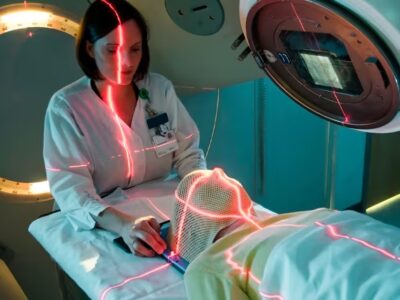
If you’re seeing more wrinkles every morning, more aching joints, fatigue and other symptoms of aging, don’t let it get you down. Aging specialists are unraveling more and more secrets of aging every day, including one that’s especially promising for seniors.
It’s called hormone balancing.
According to preventive medicine expert Dominique Fradin-Read, MD , nearly 50% of men and 40% of women suffer from some kind of hormonal imbalance. Symptoms may include loss of energy, low self-confidence, a lackluster sex life or vague feelings of disorientation or alienation. Seventy percent of patients have no idea what is causing their problems.
We sat down with Dr. Read recently for more insights into how her busy Los Angeles clinic uses hormone balancing techniques to bring hope and health to suffering patients. Here’s how she answered our questions:
Q: Dr. Read, what can you tell us about the role of hormones in the body and why it’s so important to keep those hormones in balance?
Dominique Fradin- Read, MD: Hormones are the essence of life. They act as messengers to control various functions in our body including supporting reproduction and sexual function, development and growth, maintenance of the internal environment, and regulation of metabolism and nutrient supply.
When you look at the complexity of the endocrine system and all the constant communication and feedback between the glands that secrete these hormones and our organs, you understand why it’s a serious issue if this system gets imbalanced. This happens as you get older and is part of the hormonal aging process. Sex hormones, for example, decrease in women in their 40s/50s just as men, at a later age, experience decreasing amounts of testosterone and androgen production.
The aging process can also happen at the thyroid level. The adrenals or the pancreas which produce hormones such as the thyroid hormones, cortisol and insulin might then be disturbed. This really impacts the general health of aging patients.
Restoring hormonal balance contributes to feeling better and can have tremendous benefits on the aging individual. Patients see positive effects on their metabolism, energy and vitality, stamina, cognitive accuracy and aging issues.
Q: Do hormones play a role in weight control or only in aging?
Dominique Fradin- Read, MD: When I see a female patient in her 40s or 50s who has weight issues, I always look closely at her hormone levels. Complaints of hot flashes and weight gain are among the main issues that are brought to me at that age. That’s why we often begin with a full metabolism evaluation.
The female hormones (estrogen and progesterone) “talk” to other hormones such as insulin, cortisol and thyroid. At the time of hormonal change, however, the harmony between these hormones is sometimes lost. In many cases, this results in unwanted weight gain. So yes, establishing a good hormone balance can help with weight control, too.
Q: What are the signs that my hormones are out of balance and that I need to consult my physician?
Dominique Fradin- Read, MD: The first signs of hormones imbalance are often disturbed sleep and mood issues. Women can become extremely tired if they do not sleep well at night. During the day, they might feel impatient, short tempered and irritable. Their menstrual cycle becomes irregular. Then they start putting weight on, usually in their mid-section.
Hot flashes, night sweats, lack of libido, vaginal dryness come later and are signs of more advanced menopausal changes.
- What are the effects of hormone replacement therapy? Is it effective for both men and women? Is the treatment customizable to individuals?
Dominique Fradin- Read, MD: There are different types of hormones replacement and different formulas and dosages that we can use. There is no exact science for the doses of hormones and every patient is different.
First, I investigate to see how my patient reacted if they were exposed previously to hormones though contraception or for fertility treatments. “How did you do with the birth control pill? You didn’t do good? You might be sensitive to hormones”. And then I ask: “How did you do in your pregnancies?” “Oh, I felt great in my pregnancies.” That tells me the patient is likely compatible with hormone treatment.
Next I do a laboratory evaluation of the current level of estrogen and progesterone in blood to see where we are, because we might just be in perimenopause and if so, we have to start gently.
Finally, we customize the dosage depending on patients’ needs. I always tell my patients: “You will become your own boss. You will know if you need more estrogen cream or a bit less. And you will be the one telling me if you want to change your dosage.”
- Can hormones directly affect signs of aging such as wrinkled skin, hot flashes, mood changes, brain fog, decreased libido, thinning bones, etc.?
Dominique Fradin- Read, MD: Recent studies have indicated that sex hormones not only help with levels of vitality and internal support of the bones, but they also support improved brain functioning. They regulate libido and mood changes, and help with appearance by keeping the skin more plump which reduces wrinkles and hair loss.
- What are bioidentical hormones, and do you use them in your practice?
Dominique Fradin- Read, MD: The phrase “bioidentical hormones” means that we use hormones identical to the hormones (estradiol, estriol and progesterone) produced by a woman’s body.
I use bioidentical hormones in my practice for the estrogen, applied through the skin, which reduces the risk of cardiovascular disease and clotting linked to oral estrogen.
- What should patients be cautious about when it comes to hormonal treatments? Should they beware of certain hormone pellets, pills or creams as advertised on TV?
Dominique Fradin- Read, MD: Prescribing hormones needs to be carefully evaluated for the right formula and right dosage to be offered to our patients. No single treatment fits every woman. Benefits and risks need to be closely measured in each case. In line with recommendations from The American Society for Menopause, we start with the lowest dose possible, for a length of period adapted to the patient’s needs.
As for those hormone products you see on TV, be very leery. Always consult with your physician before taking any kind of hormonal product.
The Major Take-away: Balanced Hormones Can Improve Your Life.
Hormonal imbalances that make aging so challenging can be fixed. Age-related issues can be controlled or even eliminated, and your quality of life can remain high and enjoyable well into your senior years.
“The payoff,” Dr. Read said in closing, “is the potential for a longer, more enjoyable life free from pain and full of promise and vitality. If you’re experiencing aging issues of any kind, your first step should be to contact your personal physician.”











